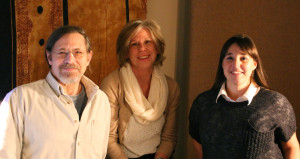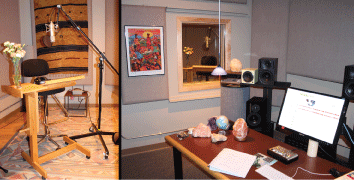Airshow engineers Anna Frick and Jon Gold joined me to pool our thoughts on how a self-publishing author can affordably release their ideal audiobook. In Part I and Part II, we covered pre-production, recording, and post-production. In Part III, we explore a real-world production and manufacturing budget for an audiobook narrated by the author.
Download FREE Audiobook Production Whitepaper
What will your audiobook cost to produce?
Our example audiobook started life as a 200-page book of about 50,000 words and resulted in six hours of finished audio. In our example, the independent author, for budget reasons and a desire for creative control, chose to narrate his or her own work, perhaps with a producer, and with the support of an experienced studio team-like us!

-
Jon Gold has extensive experience recording, editing and mastering spoken word audio for a variety of media. Anna Frick (right) spent the first four years of her career with a leading multimedia publisher of titles about spirituality, yoga and self-empowerment.
Pre-production
For our six hours of finished audio, we’d expect a producer to spend 12 to 15 hours preparing for recording, some of that time with the narrator.
Recording
We noted in Part II of our series that a ratio of 2:1 or 2+:1 studio time to audio content is a realistic pace. The time in the recording studio involves the narrator, the engineer, and the producer. Our book can take 12 to 18 hours of recording time for three professionals in a studio. (Typically, the engineer’s hourly rate includes the studio itself and all the gear required for the project.)
Post-production
The time required for editing and retakes is hardest to estimate in advance. Plan to do a good job as narrator, and post-production may take 2.5 to 4 hours for each hour of audio content, or 15 to 24 hours in our example. If a pro producer is part of the team, the producer may edit outside of the studio control room and involve the engineer and the studio only in a portion of this time. In the scenario where the author is narrator and producer, editing takes place side by side with the engineer in the control room.
Mastering
In record production, mastering plays a big part in the overall flow and sound of the music. With audiobook production, mastering involves some sonic polishing (equalization, compression, limiting) but is primarily concerned with the creation of master parts to the specifications of the CD manufacturer and the digital distributor. Expect that mastering will take 1.5 to 3 hours per hour of audio, or 7 to 15 hours in our example.
Master parts
Your audio files will become masters as electronic files or physical CDs or both. The master parts will be formatted for digital download release; formatting includes chapter and subchapter breaks, summing stereo to mono signal, and converting masters to MP3 files per the distributor’s delivery guidelines. If you are also releasing a CD version, the files for the CD version will be stereo and compiled into CD-length (maximum 80-minute) sections. Both versions will have your ISRC (the international code that identifies audio and visual intellectual property) attached to each chapter or CD-length master. Once the parts are created, they are quality checked, which involves both a software test and listening from end to end in real time. Budget another $150 to $250 per hour of audio for master parts, or $750 to $1,250 in our example.
In our example of the 200-page book, with a two-person production team of engineer and author, a realistic production and parts budget at Airshow ranges from $5,000 to under $7,000.
Manufacturing
For our six-hour audiobook, a five-CD package will be required. Manufacturing a small quantity (500 units) can cost from $6 to $18 per package, depending on packaging type, and you will need artwork for the package and each disc face. CDMP3 is a hybrid format, where a physical disc holds the digital files. Many U.S. auto brands come with in-dash CDMP3 players. The MP3 files created for download are repurposed for this format and in our example would all fit on one disc for greatly reduced manufacturing costs.
Audiobook pricing: Can you make money with your audiobook?
We’ve covered the production budget, but only you can figure out if releasing an audiobook is a good business choice. As you research the audiobooks of your peers and of superstars in your field of expertise, you will be able to refine the pricing and royalty information we provide here.
How much do audiobooks sell for? How much can a self-publishing author earn? Of course, earnings will ultimately depend on how many people you can get to purchase your audiobook. Many authors find that leveraging the power of social media is an effective method of expanding their online presence and building an audience that ultimately converts into readers. They often establish themselves on platforms like Instagram and will use growth services like Nitreo to give a boost to their instagram followers which helps them to organically increase their reach online. With a strong base of followers, authors can promote their latest works their audience with confidence that doing so will generate sales. That five-CD, six-hour audiobook might retail via Amazon or other large retailers for $18 to $24 in CD form, or $15 to $18 as a download. (By comparison, the ebook might sell for $8 or $10.) Audiobooks in CD form vary widely in price; check some online prices in your topic area.
When you sell CDs or downloads directly, either in person or via your website, you retain most of the revenue, save for fulfillment and payment-processing costs. Selling audiobooks via digital download only, through Audible and iTunes, yields a top royalty of 40{78247d6b22ac27135341102d75ec43dc193986201927d8d8e39f5e476ed6f5be} of the retail price. Your Kindle ebook customers can buy the Whispersync™ companion for just $2. While smaller general-interest retailers and niche retailers have varying royalty rates and pricing structures, expect that the bulk of your sales will come through your own channels or the two majors.

-
Airshow’s studios are well-equipped for an author to self-produce an audiobook, with the support of experienced engineers in a studio purpose-built for voice-over recording.
Considering releasing an audiobook?
We’re happy to explore all the options for assembling the right production team for your project. Please contact Ann Blonston in the Boulder studio at (303) 247-9035 or [email protected].
